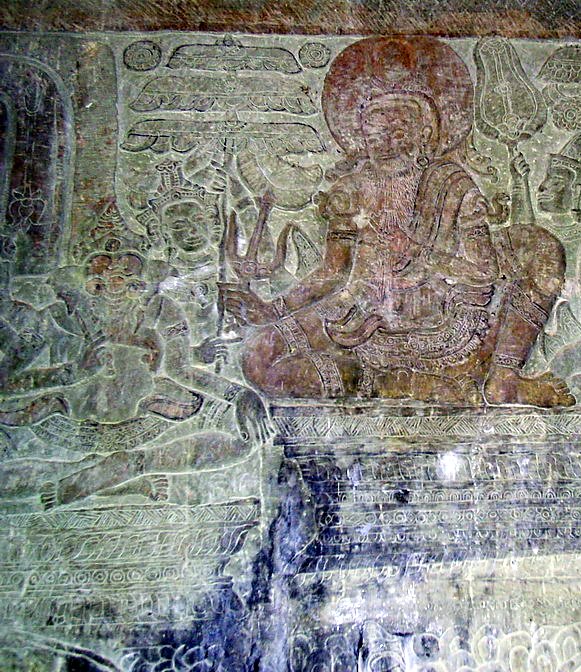
Table of Contents (The Complete Condensed Mahabharata in Simple English)
Previous Post: Satyavati’s Birth
Satyavati grew up into a virtuous and beautiful young woman, and because she was around fisherfolk all the time, her body smelled of fish. This young maiden ferried a boat across the Yamuna River to help her foster family.
One day, Rishi Parashar saw Satyavati when he happened to pass through that region. He became so enamoured by her beauty that a strong desire to unite with this young woman arose in him.
He approached Satyavati and said, “Accept my embrace, O blessed one.”
Satyavati replied, “O holy one, there are rishis standing on both the banks of the Yamuna. How can I grant you this wish when they can see us clearly?”
Hearing Satyavati’s words, Rishi Parashar created a fog that enveloped that entire region in darkness. Satyavati was filled with wonder when she witnessed this feat of the rishi, and she blushed as soon as she realised the implication of the fog. Feeling shy and embarrassed she said, “O holy one, I am a maiden who lives in her father’s house. I will lose my virginity if I accept your embrace. O sinless one, how will I return home? Think about this O holy one and then do what is correct.”
The noble rishi was pleased by her words. He replied, “O beautiful maiden, you will remain a virgin even if you grant my wish. O maiden with a beautiful smile, ask me for a boon. My words have always come true.”
Satyavati asked the rishi to remove the swell of fish that emanated from her body and replace it with a sweet fragrance. Rishi Parashar immediately granted her wish.
Pleased that her wish was fulfilled, Satyavati’s body immediately manifested its fertile season and she accepted the embrace of the rishi.
After this event, Satyavati always emitted a sweet and beautiful fragrance wherever she went. She became known as Gandhavati and Yojanagandha because her sweet smell left its mark for the distance of one yojana.
The child conceived from her union with Rishi Parashar was born that day itself on an island in the Yamuna. This child was gifted with immense energy. As soon as he was born, he asked for his mother’s permission to practise asceticism and left the island saying that he would appear before her as soon as she thought of him.
This child was called Krishna-Dwaipayana. ‘Krishna’ because he had a dark complexion, and ‘Dwaipayana’ because he was born on an island.
After leaving the island where he was born, the learned Dwaipayana saw, through his inner vision, that virtue and the strength of humans and their lifespan diminishes with the passing of every yuga.
Motivated by the desire to obtain the favour of Brahman Deva and the brahmanas, Rishi Dwaipayana, organised and classified the four Vedas and was thereafter known as Vyasa. Sometime after that, he composed the Mahabharata which is also known as the fifth Veda.
He taught all these works to Sumanta, Jaimini, Paila, his son Suka, and Vaishampayana.
Next Post: A Summary of the Birth of the Main Characters in the Mahabharata
Click on the image below to check out the book — Namaha.

